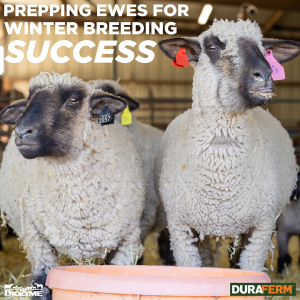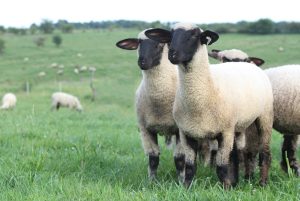
Sheep are clever eaters. We like to call them nature’s first “foodies.” But what do sheep eat? We’re here to explore not only what sheep eat but also what they need to thrive while producing meat, wool, and milk.
How Sheep Eat
First of all, sheep are ruminants, meaning they have a complex stomach with four compartments. This allows them to effectively break down fibrous plant material. They chew their cud, which often resembles chewing gum, regurgitating partially digested food to chew it again and aid in digestion.
Sheep are highly selective grazers. They prefer tender, leafy vegetation and will often avoid eating coarse or thorny plants if given a choice. This selective grazing can help manage pasture quality by preventing the overgrowth of certain plant species. They have also been observed to use their tongues to select specific plants and avoid those they don’t like (see, they are foodies). They are more strategic and discerning in their grazing than they might appear at first glance.
Not only are they grazers, but they are also nibblers, as they take more delicate bites, unlike their larger ruminant counterpart, the cow. Cows will grab large mouthfuls of grass, whereas sheep nibble delicately. This behavior allows them to eat closer to the ground and consume shorter grasses that other livestock might leave behind.
DuraFerm® Can Help
DuraFerm® is a renowned brand of nutritional supplements for sheep and goats. Our products support optimal digestion and nutrition for maximized performance at every stage of production.
Best of all, DuraFerm products use the latest technology and organic trace minerals to improve reproductive success in sheep and goats. If you’re looking to take your operation to the next level, DuraFerm has your back.
The DuraFerm brand is developed by BioZyme® Inc., a leading fermentation company pioneering advancements in animal nutrition and health. Through innovative research and high-quality manufacturing, BioZyme creates powerful solutions that improve animal performance and support producer profitability in the agricultural industry.
Our mission: undeniable positive impact on the health and wellness of your animals and your business.
So, what do sheep eat?
What do sheep eat? Well, it turns out a lot of things. Like all animals, sheep require a balanced diet to thrive, grow, and maintain their health. They need energy, protein, vitamins and minerals, fat, roughage, and water for overall health and reproductive success and to promote milk, meat, and wool production.
Forages
Sheep can get a lot of their nutrients—energy, protein, vitamins, and minerals—from grazing high-quality pasture or eating good-quality grass or alfalfa hay. As ruminants, it is important that they get fiber daily, as it aids digestion and helps maintain a healthy rumen. It’s crucial for sheep’s overall digestive health.
Energy from Forages
Energy is essential for growth, milk production, and overall maintenance. It’s usually the most limiting factor in sheep diets.
Energy from Grains
Corn, barley, oats, and wheat are important sources of energy for the flock. They are high in carbohydrates and provide a concentrated source of energy. Grains are especially important during periods of high energy demand, like late sheep gestation and lactation. Grains are also used to supplement forage diets when pasture quality is low.
Energy from Fats
Fats provide a concentrated energy source and are essential for certain bodily functions, including the absorption of fat-soluble vitamins. Limited amounts of fat are found in grain and oilseed.
Protein
Sheep get their protein from legumes like alfalfa hay and clover, soybeans, and commercial protein supplements. Protein is necessary for muscle development, wool growth, and overall bodily functions. Young, growing lambs and lactating ewes have higher protein requirements.
Vitamins & Minerals
Certain vitamins and minerals are essential for basic metabolic functions, immune response, bone development, reproduction, and overall health in your flock. Deficiencies or imbalances can lead to serious health problems.
Vitamins that are required include:
- Vitamin A: Found in green leafy forages
- Vitamin D: Produced when sheep are exposed to sunlight
- Vitamin E: Found in fresh forage and some grains
Minerals that are vital to your flock’s health include:
- Calcium & Phosphorus: Found in forages, grains and mineral supplements
- Salt: Provided as loose salt or in mineral blocks
- Trace Minerals: Selenium, copper (in safe amounts), zinc & iodine; provided through fortified feeds or mineral blocks.
Water
Like with all animals, water is the most important nutrient for survival. It is essential for all bodily functions, including digestion, nutrient transport, and temperature regulation. Make sure your sheep have clean, fresh water readily available.
Sheep are flocking animals, so they often go to water in large groups. Having a pond or tank large enough for a large group is important to ensure they can all drink at one time.
Let DuraFerm Help Strengthen Your Stock
Perhaps instead of asking, “What do sheep eat?” you should ask, “What do sheep like to eat?” The answer: DuraFerm.
DuraFerm provides you with great nutritional supplements for your flock through all stages of production.
The following products are sheep supplements in the DuraFerm line you should consider when selecting a mineral for your flock.
DuraFerm® Concept•Aid® Sheep
DuraFerm Concept•Aid Sheep is a free-choice vitamin and mineral supplement for sheep designed to support reproductive success. The loose mineral comes in a 50-pound bag. It contains AO-Biotics® Amaferm®, a prebiotic research-proven to enhance digestibility.
This breeding mineral contains high levels of vitamin E for reproductive tract repair and supports embryo production and conception using organic trace minerals, including zinc, manganese, and selenium.
DuraFerm® Concept•Aid® HEAT® Sheep
DuraFerm Concept•Aid HEAT Sheep is a free-choice vitamin and mineral supplement for sheep designed to support reproductive success when temperatures are above 70 degrees Fahrenheit. It comes in a 50-pound bag and contains Amaferm to enhance digestibility.
DuraFerm Concept•Aid HEAT Sheep includes HEAT technology, a combination of essential oils and garlic, to support animals when heat and insects are a challenge. It supports embryo production and conception using organic trace minerals, including zinc, manganese, and selenium.
DuraFerm® Concept•Aid® Protein Tub Sheep
DuraFerm Concept•Aid Protein Tub Sheep is a protein tub with vitamins and minerals for sheep designed to support reproductive success. The 125-pound tub also contains Amaferm to enhance digestibility and the Concept•Aid sheep mineral package in a 16% natural protein tub.
This protein tub supports embryo production and conception using organic trace minerals and high levels of vitamin E.
DuraFerm® ONE Sheep
DuraFerm® ONE Sheep is a free choice vitamin and mineral supplement for sheep designed to promote performance year-round. The newest product in our line, ONE also contains Amaferm to enhance digestibility.
DuraFerm ONE Sheep meets or exceeds nutrient requirements throughout the production cycle. It is formulated with research-proven organic zinc for enhanced bioavailability and comes in a 50-pound bag.
Get your DuraFerm Today
Now that we’ve explored “what do sheep eat,” we are ready to help provide you with a quality nutritional supplement for your flock.
You can purchase DuraFerm products powered by AO-Biotics Amaferm. DuraFerm is available through the extensive BioZyme dealer network. Locate a dealer near you today. DuraFerm offers reproduction resilience and retention. What more could you ask for?
You can also gather more information about DuraFerm from our educational blog series or by signing up for our newsletter.

